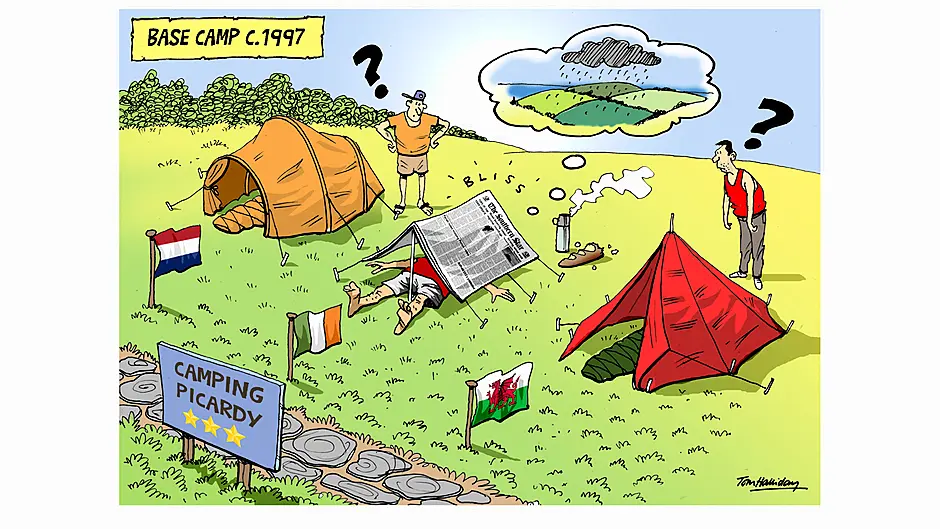
BACK in 1997, I spent a summer living and working on a campsite in the Picardy region of France. Every few weeks I’d receive a package in the post from my mother, a rolled-up copy of The Southern Star – which I’d open out and enjoy over a cup of freshly-brewed French coffee.
There was a nice feeling of connection to home as I sat there leafing through the paper in the morning sun, keeping track of the local news, including all the parish notes and the escapades of the Ardfield U12 footballers. My colleagues – English, Welsh and Dutch to a man – found the contents to be so obscure that it may have been a missive from outer space. ‘What the hell is Tops of the Town?’, they would ask. Or, ‘Is Macra a form of heavy metal?’ And, ‘You’re telling me you do ten pin bowling on the roads?’
This, bizarrely, came into my head earlier in the week when I was following the coverage of the tragic refugee crisis that is enveloping Ukraine at the moment. If the simplicity of reading my local paper was such a meaningful act to me in those formative years on my travels around free Europe, when I needed an emotional connection to home and to my people, what on Earth goes through your head when the land you hold so dear is being torn apart and your loved ones with it?
It’s been a confusing and upsetting week of news that’s been hard to process and often difficult to comprehend.
Who would have thought we’d be back here, in what is arguably the most dangerous moment since the end of World War II?
In the wake of Covid-19 (remember that?) many of us had hoped for a more united humanity, with re-aligned priorities, buttressed and enlightened by the experience of battling an invisible virus together.
In this brave new world, we could finally focus on the collective global battles to come, whether that be a cure for cancer, facing up to global warming or perhaps finding out how they get the figs into the fig rolls. The big issues, like.
But no. It’s a case of one step forward, forty goosesteps back.
Instead of spring barbecues and a return to arbitrary hugging, we’ve got an even worse sort of virus in the form of a psychopath stalking the land in Ukraine. And to make matters worse, Putin is using the sort of brutal, outdated tactics one could only expect from a brutal, outdated kleptocracy masquerading as a civilised nation.
For shame, Russia. For shame.
I realise that the good people of Russia aren’t the ones behind this slaughter. And God knows they will bear the brunt of the sanctions, not Putin and his phalanx of cronies. But unfortunately, they are now the people with the best chance of putting a stop to it in lieu of a world war. Of course, given the amount of state brainwashing that’s gone on in that country, from the widespread, pseudo-fascist use of the letter ‘Z‘ to support the invasion, to the obliteration of the free press, you wouldn’t hold out hope for a swift decapitation.
They’re not the Irish Labour Party, like.
Like many of you, I spent the first few days of the conflict doom-scrolling on my smartphone, moving from one horror to the next on Twitter as the brutal reality of the war made itself known. The unspeakable tragedy of it.
At some point, I decided I had to stop. Not bury my head in the sand, necessarily, but I was of no help to anyone in a state of impotent rage and fight-or-flight anxiety.
Our brains were not designed to keep track of news breaking on a minute-by-minute basis.
They are definitely not designed to monitor an ongoing war via our smartphones. They are barely equipped to keep a Wordle streak going.
It was hard enough to process when 24-hour news channels emerged during the first Gulf War.
It is now bordering on self-flagellation with the proliferation of fake news and information warfare.
It is no coincidence that this information explosion coincides with the biggest youth mental health emergency, perhaps in the history of the world.
So I’ve decided to take action by limiting my daily intake of news to two official news bulletins a day from a reputable source.
The rest of the day I work, I enjoy my family and I thank God I live in the West. Whatever fantasies to the contrary you might hear from the likes of Clare Daly and Mick Wallace, or any of the other alphabet apologists for that matter, can be taken with a pinch of the finest Atlantic sea salt.
Of course, I still return to my dear Southern Star every week to check in on Tom Halliday’s cartoon … and the Ardfield U12s.
Pirates, wars and Cromwell
IN a further attempt to avoid all the worrying news, I’ve recently been immersing myself in The Coast of West Cork, Peter Somerville-Large’s celebrated account of his exploration of West Cork by bicycle in the early 1970s.
I bought it on a whim in Kerr’s Bookshop on a recent trip home.
It’s a fascinating window into a much simpler, and markedly less affluent time, but it’s not quite the peaceful ramble around the highways and byways I had expected. Somerville-Large has a great knack for combining the contemporary with the historical, and I’m sorry to report that the history bits are wall-to-wall carnage.
From marauding pirates sacking Baltimore to the Game Of Thrones-esque vibes of the Battle of the Big Cross to reports of Cromwell’s gruesome war machine ... it’s fair to say my efforts to avoid war coverage have failed miserably.
It just goes to show that we’ve only very recently come to peacefully enjoy and relish this little country of ours, despite all its problems.
This is a thing to be celebrated, cherished and is, in my opinion, worth fighting for.
All of a sudden, the liberal order that was instrumental in bringing prosperity and real freedom to our own downtrodden little island isn’t as secure as we might have thought. We should never take it for granted.








